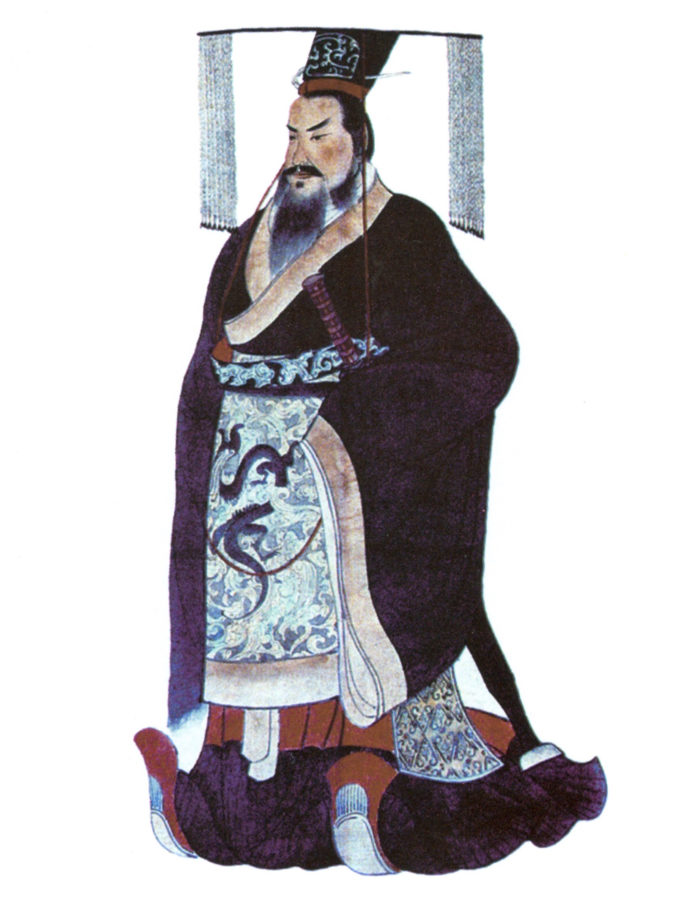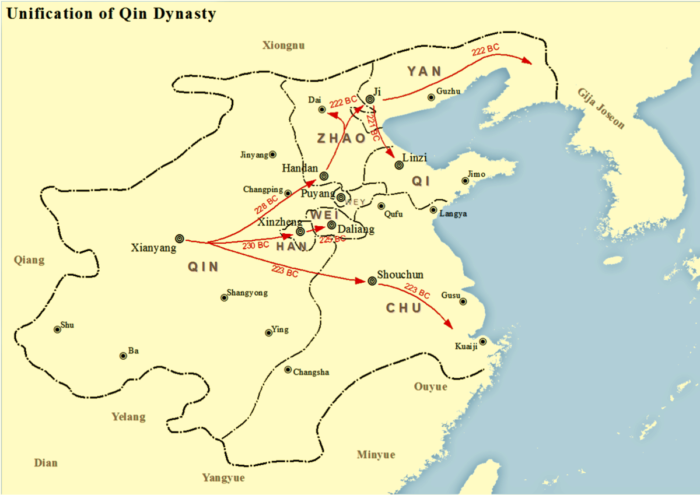by Michael Wood
Author Michael Wood has traveled the length and breadth of China, the world’s oldest civilization and longest lasting state, to tell a thrilling story of intense drama, fabulous creativity, and deep humanity that stretches back thousands of years. Read an excerpt from his new book The Story of China below.
The philosopher Mozi (468–390 BCE) first proposed that the remedy for universal disorder was the establishment of a universal ruler. He envisioned meritocratic appointments of state officers, supervision of office holders and the unification of thought and behaviour, but with ideological conformity enforced within a strongly ordered society. Even the famous Dao De Jing, written by Laozi around the sixth century BCE, saw the logical extension of the vision of unity as a correspondence between the political and metaphysical orders: ‘The Dao is great, Heaven is great, Earth is Great, and the King is great. There are four greats in the state and the King is one of these.’ With that we are on the way to the intellectual formulation of a vision of imperial kingship, a oneness both cosmic and political. When asked how to stabilise ‘All Under Heaven’, Mencius, China’s second sage, replied: ‘Stability is in unity.’ If the ruler is humane and just, ‘nobody will not follow him: if this really happens the people will go over to him as water flows downward. Who will stop it?’
And so it proved to be. By the third century BCE, all agreed that unity of government was the precondition to implementing the principles of the Way, and hence the path to peace and the Great Unity. But how was it to happen? Of course philosophers, especially Confucian ones, could not advocate that it should come about through violence. It was impossible to contemplate a just prince killing his way to power. But nor was it likely that any of the big states would voluntarily surrender power. In the end, as so often in history, change was brought about by war. China was united by the sword and by a ruling ideology very different from the Confucian ideal.

This image is in the public domain via Wikicommons.
The key text that underwrote the unification is The Book of Lord Shang. Written by a Qin dynasty thinker of the fourth century BCE, it is one of the most remarkable books of the ancient world, East or West. It has been called the first totalitarian manifesto in history and a ‘blatant assault on traditional culture and moral values’. In China, it was despised in some quarters as a shameful argument for despotism through a cynical Machiavellian use of power. For others, though, it was a supremely useful tool. It has even been praised in our own time, when totalitarian rule was justified as ‘the first stage of socialism’, a temporary phase on the path to a Marxist utopia. The Book of Lord Shang, however, is the original.
The core of the book was written around the 340s BCE, though parts of the text were added in the next century. The book advances a legalist argument for a new form of state in which governmental power penetrates right to the base of social order, creating a society wherein every peasant is a diligent tiller of the soil, every soldier a brave and loyal supporter of the state, and every official an unswerving enforcer of a harsh code of retributive law. To facilitate this new order, Lord Shang recommended practical reforms which, in essence, have survived through Chinese history. First was the division of society into counties, districts and villages. At the base, the smallest unit was a grouping of five families mutually responsible for each other’s conduct, with the deputed head member personally liable for any crime. This was linked to a system of universal registration for all people, from birth to death. There were thirteen categories of quantifiable data, including name, place of origin, gender, names and number of children, whether too old or young to work, social ranking (as defined in the lawbooks) and holdings of animals such as horses and oxen. The whole population, therefore, could be strictly controlled through a pyramid of government and harshly enforced law. Benevolence, in fact, was not the answer to attaining ‘the Great Harmony’ as Confucius had thought, though it might be workable in the future, when unity and obedience had been fully established. For now, though, a harsh law would prevail. Even the virtuous King Wu, Lord Shang wrote, ‘seized the world by force, though he later held it by righteousness. But now none of the states of ten thousand chariots is not at war. Things have been blocked up for a long time.’
Warfare, then, was the way to establish effective kingship, and severity was the way to hold it. From family registration to the overarching conception of rulership, this was the blueprint for a total state. Lord Shang’s injunction to create a ‘rich state and a strong army’ would be the template in Chinese history down to the present People’s Republic and the ‘four modernisations’ of Zhou Enlai and Deng Xiaoping.

This file is licensed under the Creative Commons Attribution-Share Alike 4.0 International license.
By the third century BCE, there was also a revolution in military technology. High-grade weaponry and mechanical crossbows were developed, and the ability to put huge, highly disciplined armies into the field was one of the reasons unification finally became a possibility. The Qin lived west of the Zhou heartland and up to that point had been one of the many peoples who had acknowledged the earlier kings of the Zhou. They had long shared in Zhou culture and intermarried with the royal family. Yet as the Zhou declined over a century or so, the Qin developed a strong sense of their own separate cultural identity as well as a certain Spartan toughness. In 255 BCE, the Qin annexed the Zhou royal lands, the last symbol of the old political order that had endured since the eleventh century BCE. ‘These are dark times: there is no limit to the sufferings of the ordinary people,’ one old loyalist wrote. ‘The house of Zhou is destroyed. The line of the Sons of Heaven is broken . . . nothing can be worse than the absence of the Son of Heaven.’
In a series of rapid shock assaults, the Qin overcame their six main rivals, the ‘ten thousand chariot states’. Chinese imperial history had begun. The speed of success was amazing. Between 230 and 221 BCE, they swallowed up the kingdoms of the old Warring States and followed up their military triumphs with measures to fulfil the legalist blueprint. The Qin legal system was introduced with reformed weights and measures, coinage and script. There were new state rites aimed at unifying the realm. Draconian population swaps and ethnic cleansing brought 120,000 families of the ‘rich and powerful’ from recently conquered states to be resettled in the region around the capital. To commemorate his stunning victories, the emperor had giant bronze statues made for his palace, with inscriptions announcing the establishment of the ‘Great Unity’.
Michael Wood is a historian, filmmaker, and broadcaster who has written several bestselling books and made well over one hundred documentary films which are regularly seen on PBS. Some of these book-and-documentary projects include In Search of the Dark Ages, In Search of the Trojan War, and In the Footsteps of Alexander the Great. Professor of Public History at the University of Manchester, he is a Fellow of the Royal Society for the Arts, the Royal Historical Society and the Society of Antiquaries. He recently received the British Academy President’s Medal for services to history and outreach.
